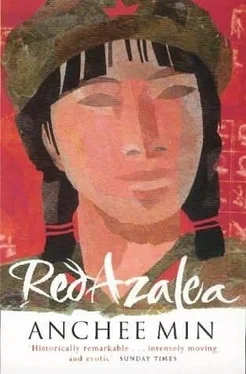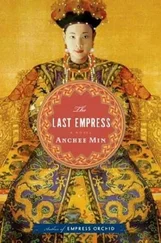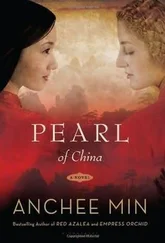Looking at my confused face, he said, You know I envy you. I really do. I envy your naïveté, your pain, and your doubts. Because I do not have them, any of them. I have no doubts, you see? My will is insuperable. Are you listening?
I asked him what made him do what he did. He got up and went to pull the velvet curtains closed. As he turned toward me, he switched off the light. In the dark he grabbed me against his chest. He embraced me. He made me want him. Then he told me in the dark, to my surprise, that he always thought that he knew women no less than I did, because he carried a female part in him as well. It was this persona that drove him to do what he did, to work for Comrade Jiang Ching, who made women heroines; to work for himself. He said by having me play Red Azalea, he could play a woman whom he had been admiring himself.
I felt the spasmodic movement of fury and painlike excitement run through his frame. Let’s be gone, he whispered in my ear. A few moments later as we caught our breath, we heard the sound of steps in the hallway. The sound of wooden sandals. Though I was prepared, I still felt horror. They were the steps of the doorman coming from the end of the hallway, coming closer. The Supervisor switched the light back on and quickly straightened his jacket. He went to open the door a slit and sat back on a chair opposite me. He pulled out a newspaper and pretended to be reading. I grabbed a pen and pretended to take notes. The steps stopped by the door. I looked at the Supervisor. He was as calm as a lake on a windless summer day. The door was pushed open. The doorman’s head popped in. He looked at us, then stepped in. He was carrying a teapot and two enamel mugs. He came by the table and poured the tea into the mugs. He did not say anything. The Supervisor began to say to me, So I want you to memorize these new changes. You must be able to perform well tomorrow.
My pen made scratches on the paper. Yes, I said. I looked at the doorman from the corner of my eye. His face was expressionless. He filled up my hot-water container, then left the room and closed the door. We heard his steps disappear at the end of the hallway.
The Supervisor said that the doorman was a sign. A sign of urgency, a sign of danger. We were being watched. He said, Now it is time for me to tell you something important. Something I must tell you before it is too late. The Supervisor’s voice trembled as the sentence landed. A strange light brightened his almond eyes. A devotee’s eyes. He took a sip of the tea and asked me whether I cared to hear a story, the true story of Red Azalea. I said, I am waiting.
She was the daughter of a woman who was abandoned by her husband, the Supervisor began. She was taught that to be born a girl was a shame. She tried to believe this the same way her mother did. But she could not. She was sixteen. She was a Communist. She joined a local opera troupe and went to Shanghai. She played Nora. She was Nora. She heard about Mao and his Red Army. His ideals were exactly hers. She went to meet her hero in a remote mountain area, in Yanan cave. She carried nothing with her but her youth. She was twenty-three and she was an actress. There she met Mao, the heavenly dragon, the red sun, the hope of China, the hope of women. She met her soul mate. He became her life and she never loved again after that. She could not forget him. She could not forget the passion in the midst of gunfire. She could not forget their bodies climaxing next to a bomb explosion. She could not forget the smashed pieces of the roof showering down on their naked bodies at midnight. They saw through the roof. There was the black-velvet sky. The sky of the Middle Kingdom.
She could not forget his laugh. He was a born poet, a born lover and ruler. He told her that it was the best performance he ever gave in his life. He did it again and again with her, in gunfire. He told her that she was his war empress. He told her that she was his life, his goddess of victory. He said that they must unite spiritually and physically. She must grant him the wish to marry her for the sake of battling for a new China, a China where a girl’s birth was cause for celebration. They joined together in the cave of Yanan. The whole Red Army celebrated the union with rice wine, peanuts and sweet potatoes.
It was the time of the Red Army in the 1930s. His troops were few. He was recruiting men, women and horses. The new couple fought together side by side. They went through fire and water, braved countless dangers. She went through battles with him. Battles which almost cost her her life.
When she walked out of one long battle in the West, her stomach was filled with leaves. Her thighs were the size of arms, her chest was a washboard. Her horse was the size of a big dog. They killed her horse to fill the stomachs of the starving Red Army leaders. Soldiers died of wounds and hunger. They died on the road. Women and babies. She survived. Her blood count was so low that she could barely stand. It was the faith of her ideals that carried her along the death-packed road. She could not describe her happiness on the day-October 1, 1949-when her man stood on the top floor of the Heavenly Peace Gate declaring to the world that China had come to the era of independence.
The Supervisor’s tone changed. His voice became hoarse. His eyes looked like two red spiders. He continued: She did not know him the way she thought she did, however. When she was presented with a contract, it was already too late for her to realize her naïveté. She was forced to sign a contract with the Party in which she was given no right to be a part of China’s political decision-making. Her battles meant nothing to the Party. She was shocked. She did not want to believe it. She turned to Mao, to the man of her strength.
Mao said that it was the Party’s decision and he must set an example for his comrades. He said that the individual must obey the decision of the group. It was the principle on which the Party was based. And she, as he emphasized it, should be no exception. She never understood his excuse. She only knew that he owned this kingdom. She began to realize that he was in the mood for a change. His love for her had faded with the smoke of the roaring cannon. She was thrown away. He moved out of their bed and never came back. She waited day and night for him, for the love she used to have. She never doubted his love. She wrote. He never answered. She went to see him but was stopped at the door by his bodyguard. His words were knives. She phoned because she did not believe his bodyguard. A young nurse, his mistress, answered the phone. She was polite but the words pierced her heart. The nurse said, Mao would like to see his wife rest quietly at the East Wing Palace. Mao said that you must remember to take your medicine on time.
She did not allow herself to cry. Her heart bled at midnight when she remembered the sky of Yanan. She could not bear to sit in the maddening house. She needed to work, to balance herself. She demanded to be with her people. But her mouth was shut by the Party’s central bureau. She was sent to Moscow under the guise of recuperation. She never liked Moscow. The cold froze her breath. She ordered Hollywood movies shipped to Moscow. She watched the movies until the last winter leaf fell on the ice. She sang her favorite old operas to get through the white nights. She never stopped petitioning. Year after year.
One day in the early 1960s she was allowed to go back to her motherland. But her husband refused to see her. He did not care how her nights went. He did not care whether she would go mad. He did not care. He told the Party that she was mad and he had nothing to do with a madwoman nor should any other members of the Party.
How did her nights go by? The Supervisor repeated the question with a voice of frightening sarcasm. The red spiders shrank in his eyes. It was like being buried, the Supervisor smiled, buried alive. But she did not accept what fate had brought her. She believed she was a heroine. She would crawl out of the grave with her bare bloody hands. Her one-time comrades had become her enemies. In fact, they had never liked her. They had never liked the actress from Shanghai. They could never trust that woman. She was too wild for them. She was never tame, never quiet; she bothered Mao after she had seduced him, they said. She had seduced China. The country was at war with her. She was attacked but she never surrendered. She did not know how. She refused to vanish. She was a reed shooting up under a heavy stone. She learned the art of war. She began her public speeches with the phrase “I am bringing you greetings from Chairman Mao.” She held the Little Red Book and shouted, “A long, long life to Chairman Mao! A long, long life to revolution!” She played it well. She was the greatest actress of her time.
Читать дальше












